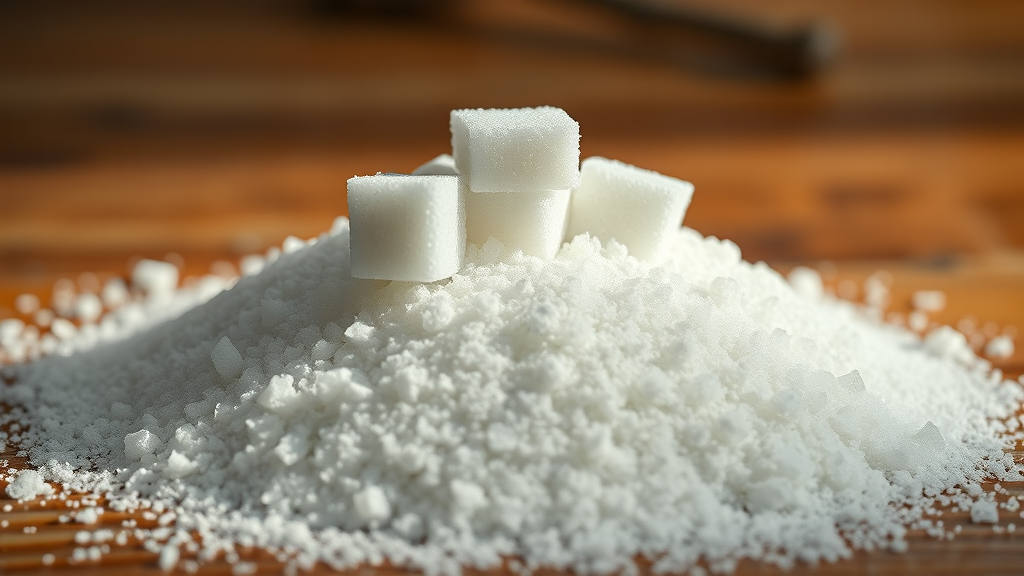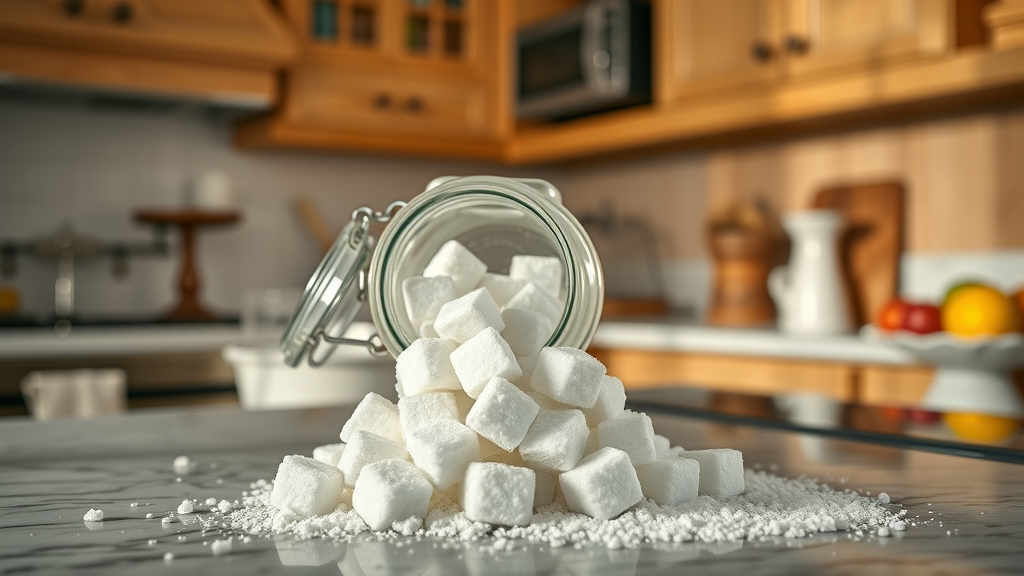Are you tired of feeling controlled by your cravings? Sugar addiction is more common than you think, and it can sabotage your health and happiness. In "Break Free from Sugar Addiction: Your Path to Wellness!", we’ll dive into the science behind those sweet cravings and reveal how breaking free can transform your life. Imagine regaining control, boosting your energy, and improving your overall well-being! Join us on this journey to understand sugar addiction and discover practical strategies to reclaim your health and happiness. Your path to wellness starts here!
Understanding Sugar Addiction
What is Sugar Addiction?
Sugar addiction refers to a compulsive behavior where individuals feel a strong urge to consume sugary foods and beverages, often leading to excessive intake. This behavior can resemble the patterns seen in substance abuse, where the brain's reward system is hijacked by the consumption of sugar. Just like addictive substances, sugar can trigger the release of dopamine, a neurotransmitter associated with pleasure and reward, making it difficult for individuals to resist the urge to indulge.
The Science Behind Sugar Cravings
The cravings for sugar can be attributed to various factors, including neurochemical responses in the brain. When sugar is consumed, it activates the brain's reward pathways, leading to a release of dopamine. This response can create a cycle of craving and consumption, similar to the effects of drugs. Studies have shown that the brain's response to sugar can lead to changes in behavior and mood, reinforcing the desire for more sugar over time.
Signs of Sugar Addiction
How do you know if you have a sugar addiction?
Identifying sugar addiction can be challenging, but there are several signs that may indicate a problem. If you find yourself frequently craving sugary foods, feeling guilty after indulging, or experiencing withdrawal symptoms when you try to cut back, you may be struggling with sugar addiction. Understanding these signs is the first step towards recovery.
8 Signs of Excess Sugar Intake
- Frequent cravings for sugary foods and drinks.
- Feeling guilty or ashamed after consuming sugar.
- Experiencing mood swings or irritability when not consuming sugar.
- Using sugar as a reward or comfort during stressful times.
- Difficulty cutting back on sugar despite wanting to.
- Physical symptoms like fatigue or headaches when reducing sugar intake.
- Increased tolerance, needing more sugar to achieve the same satisfaction.
- Neglecting other healthy foods in favor of sugary options.
The Impact of Sugar on Your Health
Physical Effects of Sugar Addiction
Excessive sugar intake can lead to numerous health issues, including obesity, diabetes, and heart disease. The body processes sugar quickly, leading to spikes in blood glucose levels, which can result in energy crashes and increased hunger. Over time, this can contribute to weight gain and metabolic disorders, making it crucial to understand the physical effects of sugar addiction.
Mental and Emotional Consequences
The impact of sugar addiction extends beyond physical health. Many individuals experience emotional and mental health challenges, such as anxiety and depression, linked to their sugar consumption. The cycle of craving and guilt can lead to emotional eating, further exacerbating mental health issues. Recognizing these consequences is essential for addressing the root causes of sugar addiction.
Breaking Free from Sugar Addiction
How to Stop the Urge to Eat Sugar
Breaking free from sugar addiction requires a multifaceted approach. Start by identifying triggers that lead to sugar cravings, such as stress or boredom. Implementing strategies like mindfulness and stress management can help reduce the urge to reach for sugary snacks. Additionally, keeping healthy snacks on hand can provide alternatives when cravings strike.
Kick the Habit in Baby Steps
Quitting sugar cold turkey can be overwhelming. Instead, consider taking baby steps towards reducing your sugar intake. Gradually decrease the amount of sugar in your diet, replacing sugary snacks with healthier options. This approach can make the transition smoother and more sustainable in the long run.
Sugar Detox: Hype or Hope?
The concept of a sugar detox has gained popularity, but its effectiveness can vary from person to person. While some individuals may benefit from a structured detox program, others may find it more helpful to focus on long-term dietary changes rather than short-term restrictions. Understanding your body and its needs is key to finding the right approach for you.
Practical Strategies for Recovery
Retrain Your Taste Buds
One effective strategy for overcoming sugar addiction is to retrain your taste buds. Gradually reducing sugar in your diet can help your palate adjust to less sweetness over time. Experiment with natural sweeteners like stevia or monk fruit, which can satisfy your sweet tooth without the negative effects of sugar.
Fill Up on Fiber and Protein
Incorporating more fiber and protein into your meals can help stabilize blood sugar levels and reduce cravings for sugary foods. Foods rich in fiber, such as fruits, vegetables, and whole grains, can keep you feeling full longer, while protein sources like lean meats, legumes, and nuts can provide sustained energy.
Choose Good-for-You Sweets
When you do indulge in sweets, opt for healthier alternatives. Dark chocolate, fruit-based desserts, and homemade treats can satisfy your cravings without the excessive sugar found in processed snacks. Being mindful of your choices can help you enjoy sweets while still prioritizing your health.
FAQs about Sugar Addiction
How long does it take to detox from sugar?
The duration of a sugar detox can vary, but many people report feeling significant improvements within a few weeks of reducing their sugar intake. The key is to be patient and consistent with your efforts.
Can Artificial Sweeteners Help?
While artificial sweeteners can provide a sweet taste without the calories, they may not be a perfect solution for everyone. Some individuals find that they still crave sugar after consuming artificial sweeteners, so it's essential to monitor your body's response.
Key Takeaways
- Sugar addiction is a real issue that can impact both physical and mental health.
- Recognizing the signs of sugar addiction is the first step towards recovery.
- Implementing practical strategies, such as retraining your taste buds and focusing on whole foods, can aid in breaking free from sugar addiction.
- Be patient with yourself; recovery is a journey that takes time and effort.
Conclusion
Breaking free from sugar addiction is not just about eliminating sugar from your diet; it's about reclaiming your health and happiness. By understanding the science behind sugar cravings, recognizing the signs of addiction, and implementing practical strategies for recovery, you can take control of your relationship with sugar. Remember, your path to wellness starts with small, consistent changes that lead to a healthier, happier you.
What You'll Learn
In this article, you will learn about the nature of sugar addiction, its signs and health impacts, and practical strategies to overcome it. You'll also find answers to common questions about sugar detox and the role of artificial sweeteners.
Video Section
Watch this informative video on the effects of sugar addiction and tips for recovery.









This HTML document provides a comprehensive article on sugar addiction, structured according to the provided outline. It includes engaging content, practical strategies, and relevant images with alt text for SEO optimization.
 Add Row
Add Row  Add Element
Add Element 



 Add Row
Add Row  Add
Add 
Write A Comment